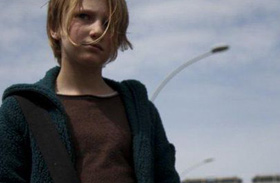Alice Rohrwacher launches into fictional filmmaking with Corpo Celeste – a realist and spiritually-minded take on the coming-of-age genre. Literally meaning ‘Heavenly Body’, Rohrwacher forms the crux of her narrative around a near-teen protagonist who faces her looming Catholic confirmation. Feeling like an airier – and less effective – Dardenne brothers picture, the loungey pacing and thin dramatic thrust put pressure on tiny details and simple pleasures, which only emerge intermittently. As a debut, though, it stakes the Italian helmer as one to definitely keep an eye on.
Moving in with her family in a run-down, but democratically aestheticized town by the name of Calabria, Marta enters a world seething in kitschy rituals. She attends a catechism to prepare for her confirmation, and embraces all of the angsts typical for a dislocated pre-teen with a mannered and calm maturity. Insecure with her sub-modest knowledge of Catholicism, Marta attempts to appear informed via mimesis and bad guessing, which extracts some comedic relief from her naïveté. Quiet moments in which she wanders the margins of Calabria, or engages in awkward idolatry, are light and effective.
Shot in a grainy film stock that would easily pass for 16mm, Helene Louvart’s (The Beaches of Agnes) hand-held photography is very deliberate in achieving its strict naturalism. The exterior scenes resist the sun, steeping the entire film in a silvery blue that explicitly ties the dawn of day with Marta’s dawning adulthood. Only the neon decor of churches, idols, and window dressings penetrate its otherwise metallic palette, matching the youthful spirit of Rohrwacher’s subjects.
Yile Vianello as Marta gives a strong performance that must have been particularly difficult because of the scarcity of dialogue. Depending more on her physical gestures and facial expressions, one couldn’t have expected a much better turn from a thirteen year-old without converting the whole project into a by-God audition tape. The rest of the thesp team are serviceable and un-distracting in their supporting bits.
Unfortunately, Rohrwacher’s idea is a bit too slight to sustain any meat on these bones. Without quite seeming like a padded-out short film, she is too reliant on the observational components of the project as a means for taking up time. The middle section is awfully inconsequential, and one gets the impression that the filmmaker is too confident in her basic premise, which holds her back from crafting more layered sequences. The lasting effect is that Corpo Celeste has a lot less on its mind – and says far fewer things about adolescence and spirituality – than it thinks it does. The experience of watching it, though, is hardly unpleasant.
Reviewed on May 18th at the 2011 Cannes Film Festival – Directors’ Fortnight section.
